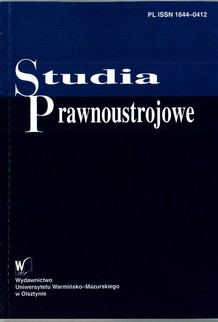The Subjective Scope of the Norm Laid Down in Article 178 Section 2 of the Code of Criminal Procedure for Confession as Governed by the Law of the Roman Catholic Church
The Subjective Scope of the Norm Laid Down in Article 178 Section 2 of the Code of Criminal Procedure for Confession as Governed by the Law of the Roman Catholic Church
Author(s): Tomasz JakubiakSubject(s): Christian Theology and Religion, Criminal Law, Canon Law / Church Law
Published by: Wydawnictwo Uniwersytetu Warmińsko-Mazurskiego w Olsztynie
Keywords: prohibition on taking evidence; minister; confession; Roman Catholic Church;
Summary/Abstract: Article 178 Section 2 CCP which says that a minister may not be examined in the capacity of a witness on facts communicated to him in confession refers to the general term “minister”. Consequently, application of the absolute prohibition of evidence it stipulates with regard to evidence produced in the exercise of religious practices in the Roman Catholic Church poses some difficulties. The problem is further compounded by the fact that in the Polish legal system the criteria for defining the concept of “minister” are not uniform. Studies carried out for the purposes of this paper show that when interpreting Article 178 Section 2 CCP, the doctrine has focused on the few norms of the internal law of the Latin Church (i.e. cann. 965 and 966 CIC), while ignoring all that is provided for in the entire legal system the Catholic Church as regards confession and its ministers. As a result of such an interpretation, the set of the referents of the term “minister” in Article 178 Section 2 CCP has been significantly reduced to the detriment of the constitutional rights of members of the Catholic Church. Therefore, in order to redirect the discussion on the prohibition of admitting evidence from the examination of ministers on facts communicated to them during confession, the author of this study went beyond the provisions of CIC usually cited in the literature of the subject. By taking into account the legal system of the Roman Catholic Church as a whole, the author has been able to propose an interpretation of Article 178 Section 2 CCP as regards its objective scope which better corresponds to the ratio legis of the norm it contains. In addition, it supplies further arguments confirming the validity of de lege lata and de lege ferenda postulates made in the literature that the subjective scope of the said norm should cover persons other than those usually listed in the doctrine, including the so-called necessary participants in confession.
Journal: Studia Prawnoustrojowe
- Issue Year: 2020
- Issue No: 49
- Page Range: 91-110
- Page Count: 20
- Language: English

